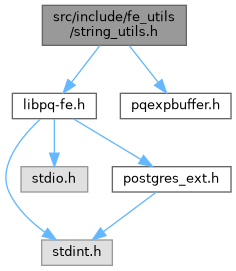

Go to the source code of this file.
Variables | |
| PGDLLIMPORT int | quote_all_identifiers |
| PQExpBuffer(* | getLocalPQExpBuffer )(void) |
Function Documentation
◆ appendByteaLiteral()
|
extern |
Definition at line 527 of file string_utils.c.
References buf, enlargePQExpBuffer(), hextbl, source, and str.
◆ appendConnStrVal()
|
extern |
Definition at line 692 of file string_utils.c.
References appendPQExpBufferChar(), appendPQExpBufferStr(), buf, fb(), and str.
Referenced by appendConnStrItem(), appendPsqlMetaConnect(), constructConnStr(), generate_old_dump(), GenerateRecoveryConfig(), get_db_conn(), runPgDump(), and start_conn().
◆ appendPGArray()
|
extern |
Definition at line 896 of file string_utils.c.
References appendPQExpBufferChar(), appendPQExpBufferStr(), PQExpBufferData::data, fb(), PQExpBufferData::len, pg_strcasecmp(), and value.
Referenced by fetchAttributeStats(), and getNamespaces().
◆ appendPsqlMetaConnect()
|
extern |
Definition at line 737 of file string_utils.c.
References _, appendConnStrVal(), appendPQExpBufferChar(), appendPQExpBufferStr(), buf, connstr, dbname, EXIT_FAILURE, fb(), fmtIdEnc(), fprintf, initPQExpBuffer(), PG_SQL_ASCII, and termPQExpBuffer().
Referenced by _reconnectToDB(), old_9_6_invalidate_hash_indexes(), and process_extension_updates().
◆ appendReloptionsArray()
|
extern |
Definition at line 960 of file string_utils.c.
References appendPQExpBuffer(), appendPQExpBufferStr(), appendStringLiteral(), encoding, fb(), fmtId(), free, i, name, noptions, parsePGArray(), and value.
Referenced by appendReloptionsArrayAH(), and get_create_object_cmd().
◆ appendShellString()
|
extern |
Definition at line 576 of file string_utils.c.
References _, appendShellStringNoError(), buf, EXIT_FAILURE, fb(), fprintf, and str.
Referenced by cluster_conn_opts(), ensureCleanShutdown(), generate_old_dump(), getRestoreCommand(), main(), output_completion_banner(), runPgDump(), start_standby_server(), and test_specific_config_settings().
◆ appendShellStringNoError()
|
extern |
Definition at line 588 of file string_utils.c.
References appendPQExpBufferChar(), appendPQExpBufferStr(), buf, fb(), and str.
Referenced by appendShellString(), and psql_get_variable().
◆ appendStringLiteral()
|
extern |
Definition at line 351 of file string_utils.c.
References buf, encoding, enlargePQExpBuffer(), fb(), i, IS_HIGHBIT_SET, pg_encoding_set_invalid(), pg_encoding_verifymbchar(), PQmblen(), remaining, source, SQL_STR_DOUBLE, and str.
Referenced by appendReloptionsArray(), appendStringLiteralConn(), and escape_append_literal().
◆ appendStringLiteralConn()
|
extern |
Definition at line 446 of file string_utils.c.
References appendPQExpBufferChar(), appendStringLiteral(), buf, conn, enlargePQExpBuffer(), ESCAPE_STRING_SYNTAX, fb(), PQclientEncoding(), PQescapeStringConn(), PQserverVersion(), and str.
Referenced by append_db_pattern_cte(), append_rel_pattern_filtered_cte(), append_rel_pattern_raw_cte(), appendQualifiedRelation(), create_logical_replication_slots(), dumpRoles(), dumpTablespaces(), dumpUserConfig(), emitShSecLabels(), get_dbnames_list_to_restore(), get_parallel_tables_list(), getTables(), lookup_object_oid(), main(), makeAlterConfigCommand(), processSQLNamePattern(), retrieve_objects(), and setup_connection().
◆ appendStringLiteralDQ()
Definition at line 484 of file string_utils.c.
References appendPQExpBufferChar(), appendPQExpBufferStr(), buf, createPQExpBuffer(), destroyPQExpBuffer(), fb(), and str.
Referenced by dumpFunc().
◆ fmtId()
Definition at line 248 of file string_utils.c.
References fb(), fmtIdEnc(), and getFmtEncoding().
Referenced by _doSetFixedOutputState(), _getObjectDescription(), _printTableAccessMethodNoStorage(), _printTocEntry(), _selectOutputSchema(), _selectTableAccessMethod(), _selectTablespace(), append_depends_on_extension(), appendReloptionsArray(), binary_upgrade_extension_member(), buildACLCommands(), buildDefaultACLCommands(), createDummyViewAsClause(), describeOneTableDetails(), dropDBs(), dropRoles(), dropTablespaces(), dumpAccessMethod(), dumpAgg(), dumpAttrDef(), dumpBaseType(), dumpCast(), dumpCollation(), dumpCommentExtended(), dumpCompositeType(), dumpCompositeTypeColComments(), dumpConstraint(), dumpConversion(), dumpDatabase(), dumpDomain(), dumpEnumType(), dumpEventTrigger(), dumpExtension(), dumpForeignDataWrapper(), dumpForeignServer(), dumpFunc(), dumpIndex(), dumpNamespace(), dumpOpclass(), dumpOpfamily(), dumpOpr(), dumpPolicy(), dumpProcLang(), dumpPublication(), dumpPublicationNamespace(), dumpPublicationTable(), dumpRangeType(), dumpRoleGUCPrivs(), dumpRoleMembership(), dumpRoles(), dumpRule(), dumpSearchPath(), dumpSecLabel(), dumpSequence(), dumpStatisticsExt(), dumpSubscription(), dumpTable(), dumpTableComment(), dumpTableConstraintComment(), dumpTableData_insert(), dumpTableSchema(), dumpTableSecLabel(), dumpTablespaces(), dumpTransform(), dumpTrigger(), dumpTSConfig(), dumpTSDictionary(), dumpTSParser(), dumpTSTemplate(), dumpUndefinedType(), dumpUserConfig(), dumpUserMappings(), emitShSecLabels(), escape_fmt_id(), fmtCopyColumnList(), format_aggregate_signature(), format_function_arguments(), format_function_signature(), get_create_object_cmd(), get_language_name(), getFormattedOperatorName(), getPublicationTables(), main(), makeAlterConfigCommand(), and setup_connection().
◆ fmtIdEnc()
Definition at line 101 of file string_utils.c.
References appendPQExpBufferChar(), appendPQExpBufferStr(), encoding, enlargePQExpBuffer(), fb(), getLocalPQExpBuffer, i, IS_HIGHBIT_SET, pg_encoding_mblen(), pg_encoding_set_invalid(), pg_encoding_verifymbchar(), quote_all_identifiers, remaining, ScanKeywordCategories, ScanKeywordLookup(), ScanKeywords, and UNRESERVED_KEYWORD.
Referenced by appendPsqlMetaConnect(), fmtId(), fmtQualifiedIdEnc(), gen_reindex_command(), and main().
◆ fmtQualifiedId()
Definition at line 296 of file string_utils.c.
References fmtQualifiedIdEnc(), and getFmtEncoding().
Referenced by _disableTriggersIfNecessary(), _enableTriggersIfNecessary(), _printTableAccessMethodNoStorage(), is_load_via_partition_root(), lockTableForWorker(), and restore_toc_entry().
◆ fmtQualifiedIdEnc()
Definition at line 263 of file string_utils.c.
References appendPQExpBuffer(), appendPQExpBufferStr(), createPQExpBuffer(), destroyPQExpBuffer(), encoding, fb(), fmtIdEnc(), and getLocalPQExpBuffer.
Referenced by appendQualifiedRelation(), fmtQualifiedId(), get_parallel_tabidx_list(), get_parallel_tables_list(), and retrieve_objects().
◆ formatPGVersionNumber()
|
extern |
Definition at line 313 of file string_utils.c.
References buf, fb(), and snprintf.
Referenced by connection_warnings(), describeAccessMethods(), describeFunctions(), describePublications(), describeSubscriptions(), listEventTriggers(), listExtendedStats(), listPartitionedTables(), listPublications(), printVersion(), and SyncVariables().
◆ parsePGArray()
Definition at line 813 of file string_utils.c.
References fb(), items, malloc, and nitems.
Referenced by appendReloptionsArray(), buildACLCommands(), dumpFunc(), dumpIndex(), dumpSearchPath(), dumpSubscription(), getIndexes(), getPublicationTables(), and processExtensionTables().
◆ patternToSQLRegex()
|
extern |
Definition at line 1219 of file string_utils.c.
References appendPQExpBufferChar(), appendPQExpBufferStr(), Assert, buf, encoding, fb(), i, initPQExpBuffer(), pg_tolower(), PQmblenBounded(), and termPQExpBuffer().
Referenced by append_database_pattern(), append_relation_pattern_helper(), append_schema_pattern(), and processSQLNamePattern().
◆ processSQLNamePattern()
|
extern |
Definition at line 1047 of file string_utils.c.
References appendPQExpBuffer(), appendPQExpBufferChar(), appendPQExpBufferStr(), appendStringLiteralConn(), buf, conn, fb(), initPQExpBuffer(), patternToSQLRegex(), PQclientEncoding(), PQserverVersion(), termPQExpBuffer(), and WHEREAND.
Referenced by describeConfigurationParameters(), expand_dbname_patterns(), expand_extension_name_patterns(), expand_foreign_server_name_patterns(), expand_schema_name_patterns(), expand_table_name_patterns(), get_dbnames_list_to_restore(), and validateSQLNamePattern().
◆ setFmtEncoding()
Definition at line 69 of file string_utils.c.
References encoding, and fb().
Referenced by escape_fmt_id(), exec_command_encoding(), main(), processEncodingEntry(), setup_connection(), and SyncVariables().
Variable Documentation
◆ getLocalPQExpBuffer
|
externdefault |
Definition at line 28 of file string_utils.c.
Referenced by fmtIdEnc(), fmtQualifiedIdEnc(), and ParallelBackupStart().
◆ quote_all_identifiers
|
extern |
Definition at line 339 of file ruleutils.c.